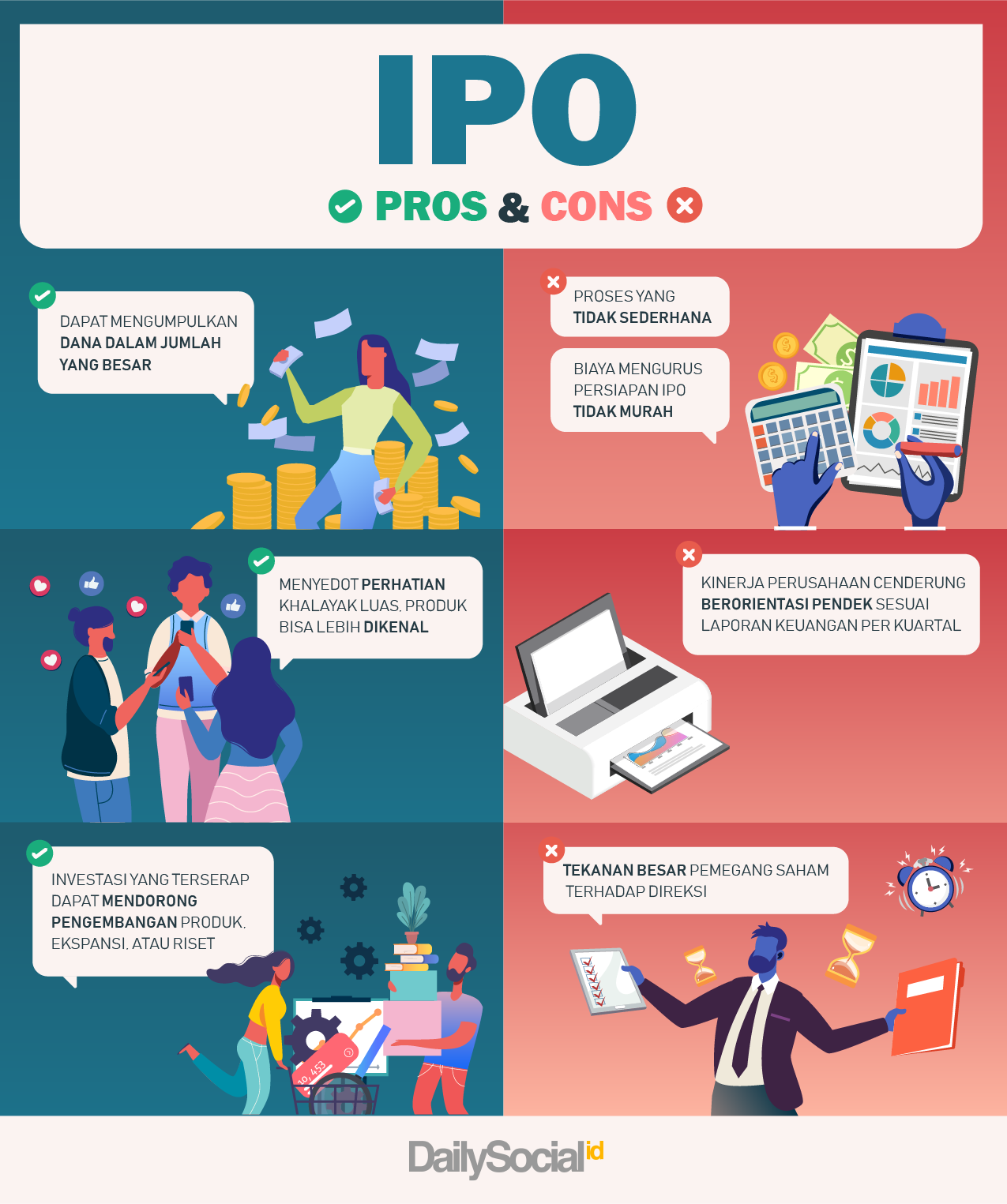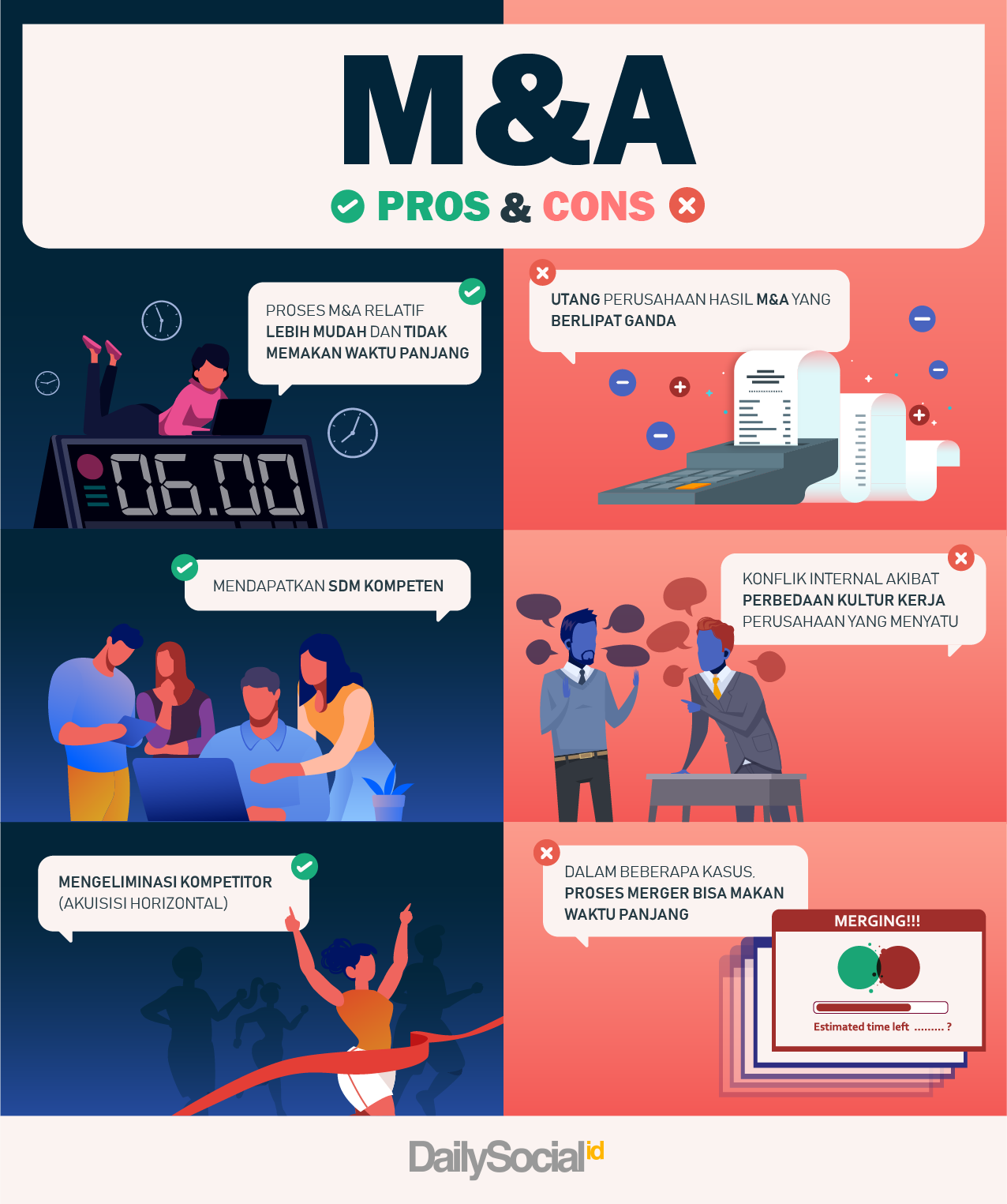Comparing IPOs and Mergers & Acquisitions As Best "Exit" Strategies
Mergers and acquisitions are still the most popular exit strategy for tech startups
For most companies, doing initial public offering (IPO) is a coveted moment. But in an industry powered by fast-paced technology and innovation, IPOs are not the only path to a beautiful exit for a startup.
In strategy exit For startups, there are at least two popular ways, namely mergers and acquisitions (M&A) and IPOs. Each of course has advantages and disadvantages.
Of the two, the IPO attachment tends to be more attached to the impression of success and is better known to ordinary people. Even in the United States there is a kind of optimistic yet pragmatic slogan that reads: We'll raise a few rounds and in a few years we'll IPO on Nasdaq (we are chasing a few rounds of funding and in a few years we are going to have an IPO on Nasdaq).
IPO
Taking the floor on the stock exchange is often synonymous with success. This is not completely right and not completely wrong. As a method of raising funds, becoming go public can be called the best way.
Although not entirely smooth, Facebook's IPO in May 2012 managed to raise funds worth US$16 billion or Rp226,6 trillion. It was the third largest IPO ever recorded in US history. IPO from Facebook can be interpreted that no matter how difficult the road to the IPO, the money collected is still very large.
With the proceeds from the IPO, a startup can expand to a higher level. But in addition to the potential to pocket a very large amount of money, IPOs also have other challenges even though the journey to the stock exchange floor is not easy.
First, the sale of initial shares requires neat, consistent, and audited financial reports. Documents such as the deed of establishment of a PT, articles of association, ministry approvals, trading business licenses, and others, must be prepared. What happened to WeWork can be an important lesson how important the company's financial statements before the IPO.
The second challenge is market pressure. When a company chooses go public, then their performance will be closely watched every three months. The stock market tends to be profit-oriented and short-term. No matter the company's prospects in the long term, if the performance every quarter is not satisfactory, it is almost certain that the stock price will fall and vice versa.
The third and one of the biggest challenges of an IPO is the potential loss of the founders of the company. This still coincides with market pressures. Investors certainly want the company to move according to their interests. And when open, companies will come under intense pressure to make decisions that are profitable for investors even if they don't match the wishes or visions of the company's founders.
The final challenge for conducting an IPO is that the preparation costs are not cheap. Prior to the IPO, the company must prepare various things by cooperating with a number of parties ranging from legal offices, auditors, and underwriters. The cost to pay for their services is certainly not cheap. But on the positive side, the Indonesian government has incentive tax for legal entities that choose to IPO. The company will get a tax reduction incentive of 5 percent to 20 percent if it goes to the stock exchange. The discount can increase by 3 percent for companies conducting IPOs if the new bill on tax provisions and facilities is passed by the DPR.
Mergers and acquisitions
Merger and acquisition (M&A) is the process of merging two or more companies into one company. Often the M&A process is much simpler than the IPO process.
Research CB Insights found that in 2016 there were 3.358 tech startups that exited and 97 percent of them chose M&A. Only 98 of those who chose an IPO as a solution were recorded. This represents a statement that M&A is more practical than an IPO.
The trend in Indonesia is similar. Startups that take M&A action are still bigger than those who choose to take the floor on the stock exchange. Startup Report 2018 from DailySocial shows that during the last year 12 companies did M&A startups, while only 4 companies took IPOs.
Basically M&A is a way of maximizing efficiency and reducing potential disruptions to the business. This can be seen from the acquisition Grab towards Uber's business in Southeast Asia in the past year. By annexing Uber, Grab automatically lose competitors in the Southeast Asian market and lose meaningful competition Grab no longer have to burn money for tariff wars, in the end the company's revenue can increase.
An example from within the country is from the consolidation carried out by the SaaS startup Mekari. The creation of Mekari started when Sleekr carried out an M&A action against Talents, Journals, and Klikpajak last year. This consolidation then affects Mekari's business, which is estimated to grow four times.
One of the benefits of M&A, which is sometimes also a motivation, is getting the desired human resources. Getting new human resources who excel in their fields is a capital to improve company performance. This is exactly what Bukalapak did to Prelo.
Although Bukalapak claimed not to have acquired Prelo, they confirmed that they did Prelo talent acquisition. One of them is Prelo Founder Fransiska Hadiwidjana who was appointed as Head of Business.
Nevertheless, there are still challenges that startup activists need to pay attention to regarding M&A options. Here are some of them:
The first is debt that can be multiplied. Debt is common in startup finance. However, this can be quite a serious problem when startups involved in M&A have large debts. The nominal debt resulting from this combination can disrupt the company's cash flow.
Second is a different startup culture. Merging two companies is like the marriage of two families. Each has a different corporate culture that has the potential to become a gravel in the company's operations if not resolved immediately.
Next is the process for M&A which is sometimes not short. It takes time to unite the perceptions of a number of parties who want to conduct M&A until an agreement is reached. Especially for mergers, there are more legal requirements and formalities that must be followed because this process forms a new company.
Sign up for our
newsletter


